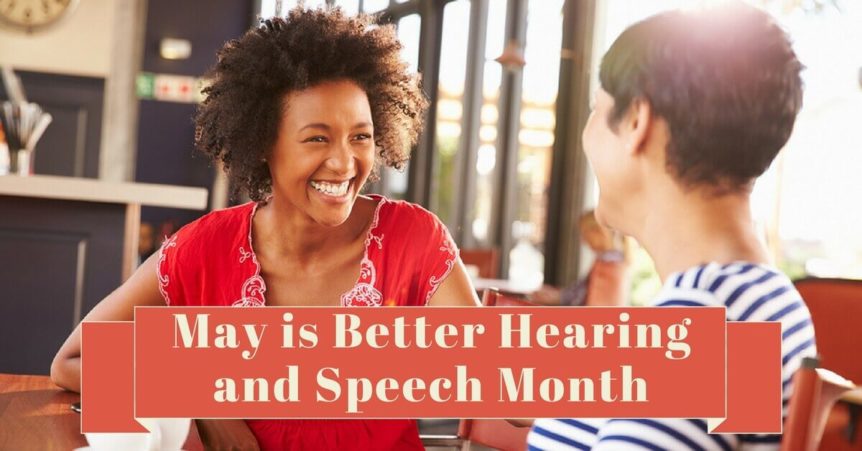There are many reasons to celebrate in the month of May. We have May Day, Mother’s Day, the return of sunshine, and don’t forget Better Hearing and Speech Month! Each May, the American Speech-Language & Hearing Association (ASHA) hosts Better Hearing and Speech Month, in an attempt to raise awareness and educate the public on issues related to hearing, speech and language. The three groups that ASHA is focusing on this year are those on the autism spectrum, those who have experienced stroke, and those with hearing loss.
“Communication: The Key to Connection”
What good is a celebration, without a theme? This year, the theme ASHA has chosen for Better Hearing and Speech Month is “Communication: The Key to Connection”. It’s widely known that communication greatly impacts the depth and stability of relationships with partners, family, friends and co-workers. When we communicate better, we feel more connected to those around us. People with issues that affect either hearing or speech can impact one’s ability to appropriately communicate, thus making connections more difficult. It is for this and other reasons that BHSM exists – to raise awareness and help sufferers understand the life-altering impact of treatment for these issues.
Communication with autism
Autism is a neurodevelopment disorder that currently affects 1 in 68 children. It is characterized by “difficulties in social communication and social interaction” (ASHA). During BHSM, think about the way you communicate and connect with people on the autism spectrum. Although social situations can be scary and confusing for those on the spectrum, people with autism seek human connection just like everyone else. When communicating with someone with autism, ASHA encourages community members to reach out, be patient, modify communication styles (pictures, written words), and not to make assumptions.
Communication after stroke
Approximately 795,000 strokes occur each year in the United States. While still most common amongst older Americans, strokes among younger age groups have risen dramatically. After surviving a stroke, many need to relearn how to care for their daily needs and relearn how to communicate. Numerous stroke survivors experience aphasia, which is a disorder that affects one’s ability to understand and produce speech. Getting help from a Speech Language Pathologist can make a positive and life-altering impact on a stroke survivor’s quality of life (ASHA).
Communication with hearing loss
While we care deeply about those on the autism spectrum and stroke survivors at Neighborhood Hearing Aid Centers, our specialty is helping those with hearing loss achieve the highest possible quality of life. This year, ASHA is focusing on noise induced hearing loss or (NIHL) and it’s dangerous and irreversible effects. About 40 million adults aged 20-69 in the US suffer from noise induced hearing loss. Of those 40 million sufferers, more than half do not work in noisy jobs. This means that many of us are losing our hearing because of our noisy leisure activities. In honor of BHSM, the American Speech Language & Hearing Association urges the public to take steps to reduce the risk of NIHL, including wearing hearing protection, reducing exposure and scheduling a hearing evaluation with a local specialist (ASHA).
Hearing Loss and Relationships with Self, Family and Friends
There have been multiple studies that show a negative impact on relationships to partners, friends, family members and coworkers. A study conducted in the UK found that 44% of respondents said that hearing loss caused their relationships to suffer. In another study conducted by AHSA, 35% of survey takers stated that of all their relationships harmed by hearing loss, their romantic ones suffered the most.
“All too often spouses blame each other’s ability to listen when in fact it is truly a hearing problem that is chipping away at their ability to communicate,” said audiologist Patricia Chute, professor and chair of the Division of Health Professions at Mercy College in Dobbs Ferry, N.Y. (http://www.healthyhearing.com/report/52619-The-impact-of-hearing-loss-on-relationships).
To make matters worse, out of the millions of Americans living with hearing loss, only about 25% use hearing aids. Don’t let this be you. Multiple studies have also connected the positive impact of hearing loss on maintaining and building relationships. How could hearing aids better your relationships?
How to Get Involved
There are multiple ways to help celebrate Better Hearing and Speech Month. Spread awareness by entering the “Speaking up for Communication” social media contest. Earn points for making comments, using one of AHSA’s key phrases on social media, and following AHSA’s Twitter and Instagram accounts. Points are redeemable for awesome prizes such as BHSM gear and Amazon gift cards. You can also purchase BHSM clothing and accessories, use the hashtag #BHSM and use the Facebook/Twitter profile picture filter. More information on these fun ways to get involved can be found here: http://www.asha.org/bhsm/.
Most importantly, reach out to us at Neighborhood Hearing Aid Centers to schedule your free hearing consultation. We look forward to hearing from you soon.

